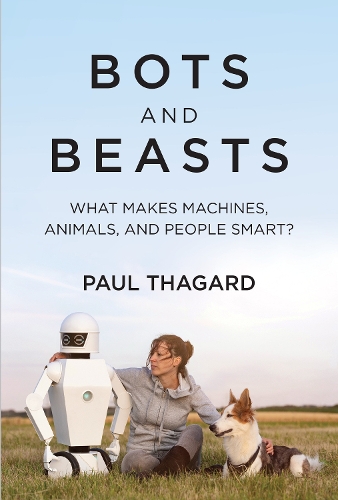
Bots and Beasts: What Makes Machines, Animals, and People Smart
(Hardback)
Available Formats
Publishing Details
Bots and Beasts: What Makes Machines, Animals, and People Smart
By (Author) Paul Thagard
MIT Press Ltd
MIT Press
2nd November 2021
14th October 2021
United States
Classifications
General
Non Fiction
156.3
Physical Properties
Hardback
304
Width 152mm, Height 229mm
Description
An expert on mind considers how animals and smart machines measure up to human intelligence. Octopuses can open jars to get food, and chimpanzees can plan for the future. An IBM computer named Watson won on Jeopardy! and Alexa knows our favorite songs. But do animals and smart machines really have intelligence comparable to that of humans In Bots and Beasts, Paul Thagard looks at how computers ("bots") and animals measure up to the minds of people, offering the first systematic comparison of intelligence across machines, animals, and humans. Thagard explains that human intelligence is more than IQ and encompasses such features as problem solving, decision making, and creativity. He uses a checklist of twenty characteristics of human intelligence to evaluate the smartest machines--including Watson, AlphaZero, virtual assistants, and self-driving cars--and the most intelligent animals--including octopuses, dogs, dolphins, bees, and chimpanzees. Neither a romantic enthusiast for nonhuman intelligence nor a skeptical killjoy, Thagard offers a clear assessment. He discusses hotly debated issues about animal intelligence concerning bacterial consciousness, fish pain, and dog jealousy. He evaluates the plausibility of achieving human-level artificial intelligence and considers ethical and policy issues. A full appreciation of human minds reveals that current bots and beasts fall far short of human capabilities.
Reviews
"There is a lot to like in Thagard's book....an enjoyable read...continually thought provoking....Intelligence is likely a multi-faceted and multi-dimensionalconcept, and Thagard does illuminate many of its features for humans,animals, and machines."
Essays in Philosophy
"...written for an educated general audience...Thagard does an admirable job of providing clear yet succinct explanations....the book should be of particular interest to instructors teaching classes in philosophy of mind or philosophy of technology."
Teaching Philosophy
Author Bio
Paul Thagard, a philosopher and cognitive scientist, is Distinguished Professor Emeritus of Philosophy at the University of Waterloo. He is the author of Brain-Mind, Natural Philosophy, The Cognitive Science of Science, Hot Thought, Mind- Introduction to Cognitive Science (the last three published by the MIT Press), and many other books. He writes a popular blog for Psychology Today and can be found at paulthagard.com.
